Be custodians of memory and builders of unity
The Pope received officials of the Roman Curia and employees of the Holy See, the Governorate, and the Vicariate of Rome, who welcomed him with prolonged applause

In his speech, the Pontiff invited everyone to preserve “the historical memory” of the Apostolic See, to not lose the “missionary dimension,” as Pope Francis desired, and to overcome misunderstandings and prejudices with patience, humility, and “humor.”
“An occasion to give thanks”: with these words, Pope Leo XIV defined his meeting with all the employees of the Roman Curia, the Governorate, and the Vicariate of Rome, whom he received in audience in the Paul VI Hall at the Vatican. Present in the Nervi Hall were some 5,000 people working in various administrative, technical, and operational areas, along with their families. Among them were priests, men and women religious, and above all, lay people.
Many children were present, some very young, leaning against the fences with their parents, hoping for a greeting, a caress, and a blessing from the Pontiff. Hopes came true, as the Holy Father, barely finished greeting some prelates, stepped down from the stage to approach them and smilingly blessed the children and their families first, and then extended his greeting to all those present.
“This, our first meeting, is certainly not the time for programmatic speeches, but rather an occasion to thank you for the service you provide, which I, so to speak, ‘inherit’ from my Predecessors,” Pope Leo affirmed at the beginning of his address.
He then recalled that he had arrived at the Vatican “only two years ago, when my beloved Pope Francis appointed me Prefect of the Dicastery for Bishops. Then I left the Diocese of Chiclayo, Peru, and came to work here. What a change! And now… What can I say? Only what Simon Peter said to Jesus on Lake Tiberias: “Lord, you know everything, you know that I love you” (Jn 21:17).”
“Popes pass, the Curia remains,” the Bishop of Rome emphasized, noting that this “is true in every particular Church, for the Episcopal Curia. And it is also true for the Curia of the Bishop of Rome.”
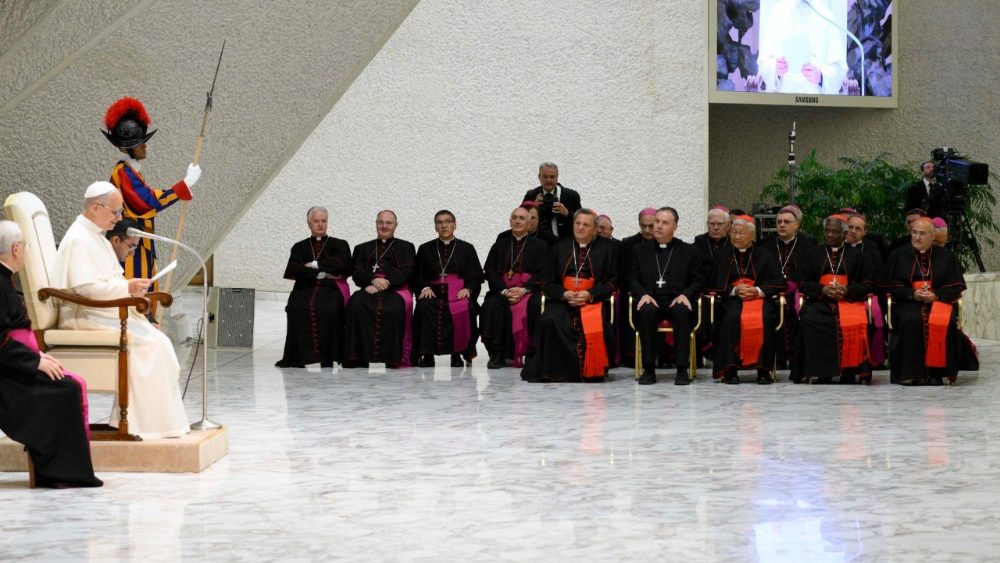
The Importance of Memory
“The Curia is the institution that safeguards and transmits the historical memory of a Church, of the ministry of its bishops. This is very important. Memory is an essential element in a living organism. It not only directs itself to the past, but nourishes the present and guides the future. Without memory, the path is lost, it loses its sense of direction,” the Holy Father then stated, explaining what it means to work in the Curia:
Working in the Roman Curia means contributing to keeping the memory of the Apostolic See alive, in the vital sense I just mentioned, so that the Pope’s ministry can develop in the best possible way. And, by analogy, this can also be said of the services of Vatican City State.
In addition to memory, the Pope highlighted the missionary dimension of the Curia and of every institution linked to the Petrine ministry, mentioning in this regard the reform carried out by Pope Francis through the Apostolic Exhortation Evangelii Gaudium and the Apostolic Constitution Praedicate Evangelium. And he has done so, he noted, following in the footsteps of his predecessors, especially Saint Paul VI and Saint John Paul II.
The missionary experience in Peru
The Pontiff also recalled that the missionary experience is part of his life, not only as a baptized person, like all Christians, but also because as an Augustinian religious, he was a missionary in Peru. “I cannot thank the Lord enough for this gift,” he affirmed. “Then, the call to serve the Church here, in the Roman Curia, was a new mission, which I have shared with you these past two years. And I continue it still, as long as God wills, in this service entrusted to me.”
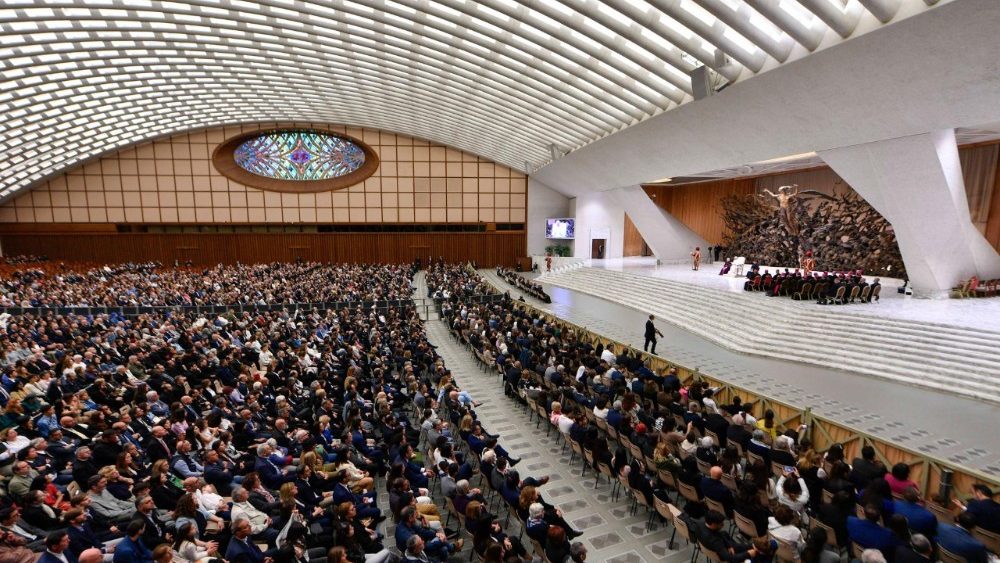
The Invitation to Be a Missionary Church
Then, Leo XIV repeated to those present in the Paul VI Hall what he had said in his first greeting on the afternoon of May 8: “We must seek together how to be a missionary Church, a Church that builds bridges, dialogue, always open to welcoming […] with open arms all, all those who need our charity, our presence, dialogue, and love. These words were addressed to the Church of Rome. And now I repeat them, thinking of the mission of this Church to all the Churches and the whole world, to serve communion, unity, in charity and truth,” the Pontiff said. He added:
The Lord entrusted Peter and his successors with this task, and all of you, in your various ways, collaborate in this great work. Each of you makes your contribution by carrying out your daily work with dedication and also with faith, because faith and prayer are like salt to food; they give flavor.
Contribute to unity with our daily behavior
Pope Leo XIV then urged Vatican employees to “cooperate in the great cause of unity and love. Let us try to do this first and foremost with our behavior in everyday situations, beginning even in the workplace.”
Each of us can be a builder of unity with our attitudes toward our colleagues, overcoming the inevitable misunderstandings with patience and humility, putting ourselves in the place of others, avoiding prejudices, and also with a good dose of humor, as Pope Francis has taught us.
Thank you again with all my heart! the Pontiff repeated before concluding his speech. And remembering that we are in the month of May, he invited us to invoke together “the Virgin Mary, that she may bless the Roman Curia and Vatican City, and also their families, especially children, the elderly, and the sick and suffering.”
Words of the Holy Father:
Audience with the Officials of the Roman Curia, the Employees of the Holy See, the Governorate of Vatican City State, and the Vicariate of Rome, May 24, 2025
This morning, at 10:00 a.m., in the Paul VI Auditorium, His Holiness Leo XIV received in audience the Officials of the Roman Curia, the Employees of the Holy See, the Governorate of Vatican City State, and the Vicariate of Rome. Below is the Pope’s address to those present during the meeting:
Address of His Holiness
Thank you! When the applause lasts longer than the address, I will have to make a longer address! So… be careful! Thank you! Thank you!
In the name of the Father, of the Son, and of the Holy Spirit, peace be with you.
Dear brothers and sisters!
I am glad to be able to greet all of you who form the working communities of the Roman Curia, the Governorate and the Vicariate of Rome.
I greet the Heads of the Dicasteries and the other Superiors, the Office Heads and all the officials, as well as the authorities of Vatican City, the managers and the employees. And I am very happy that many family members are also present, taking advantage of the Saturday.
This first meeting of ours is certainly not the moment to make keynote speeches, but rather it is an opportunity for me to thank you for the service you carry out, and this service that I have, so to speak, “inherited” from my predecessors. Thank you indeed. Yes, as you know, I arrived only two years ago, when our beloved Pope Francis appointed me as Prefect of the Dicastery for Bishops. Then I left the diocese of Chiclayo, in Peru, and came to work here. What a change! And now, then… What can I say? Only what Simon Peter said to Jesus on Lake Tiberias: “Lord, you know everything; you know that I love you” (Jn 21:17).
Popes pass, the Curia remains. This applies to every particular Church, for the episcopal Curias. And it also applies to the Curia of the Bishop of Rome. The Curia is the institution that preserves and transmits the historical memory of a Church, of the ministry of its bishops. This is very important. Memory is an essential element in a living organism. It is not only directed to the past, but nourishes the present and guides the future. Without memory, the path is lost, it loses its sense of direction.
Here, dear friends, is the first thought I would like to share with you: to work in the Roman Curia means to contribute to keeping the memory of the Apostolic See alive, in the vital sense I have just mentioned, so that the Pope’s ministry may be implemented in the best way. And, by analogy, this can also be said of the services of Vatican City State.
Then, there is another aspect I would like to recall, complementary to that of memory, that is the missionary dimension of the Church and of every institution linked to the Petrine ministry. This was insisted upon a great deal by Pope Francis who, consistently with the project laid out in the Apostolic Exhortation Evangelii gaudium, reformed the Roman Curia from the perspective of evangelization, with the Apostolic Constitution Praedicate Evangelium. And he did this by following in the footsteps of his predecessors, especially Saint Paul VI and Saint John Paul II.
As I think you know, the experience of mission forms part of my life, and not only as a baptized person, as for all us Christians, but because as an Augustinian religious I was a missionary in Peru, and in the midst of the Peruvian people my pastoral vocation matured. I will never be able to thank the Lord enough for this gift! Then, the call to serve the Church here in the Roman Curia was a new mission, which I shared with you during these last two years. And still I continue it and will continue it, as long as God wills, in this service that has been entrusted to me.
Therefore, I repeat to you what I said in my first greeting, in the evening of 8 May: “Together, we must look for ways to be a missionary Church, a Church that builds bridges and encourages dialogue, a Church ever open to welcoming… with open arms, all those who are in need of our charity, our presence, our readiness to dialogue and our love”. These words were addressed to the Church of Rome. And now I repeat them, thinking of the mission of this Church towards all the Churches and the entire world, of serving communion, unity, in charity and in truth. The Lord gave this task to Peter and his successors, and you all collaborate in different ways in this great task. Each one of you gives your contribution, carrying out your daily work with commitment and also with faith, because faith and prayer are like salt for food; they impart flavour.
If, then, we must all cooperate in the great cause of unity and love, let us seek to do so first of all with our behaviour in everyday situations, starting also from the work environment. Each person can be a builder of unity with his attitudes towards colleagues, overcoming inevitable misunderstandings with patience, with humility, putting himself in the in the shoes of others, avoiding prejudices, and also with a good dose of humour, as Pope Francis taught us.
Dear brothers and sisters, thank you again from the bottom of my heart! We are in the month of May: let us invoke the Virgin Mary together, so that she may bless the Roman Curia and Vatican City, and also your families, especially children, the elderly and the sick and suffering.
Thank you!
So, let us say together: “Hail Mary…”
[Blessing]
Thank you once again, best wishes!
__________________________
Holy See Press Office Bulletin, 24 May 2025
Related
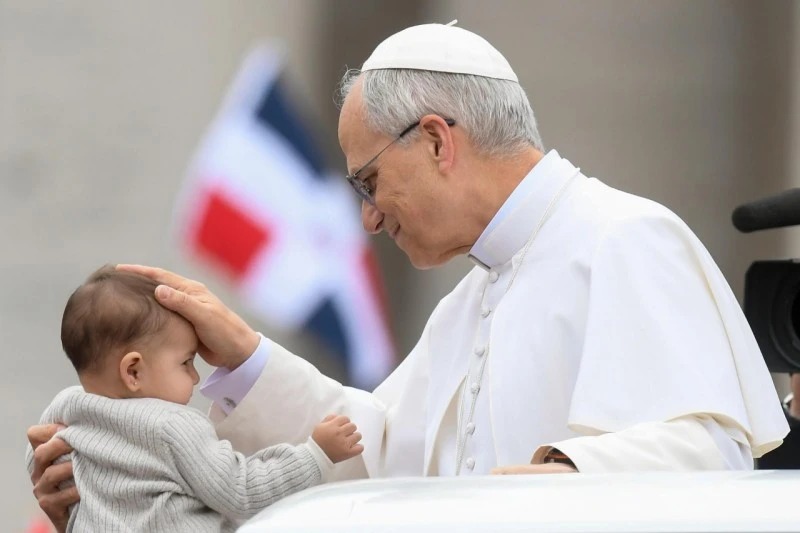
Leo XIV: “Jesus Christ, the Sower of Hope”
Exaudi Staff
21 May, 2025
9 min
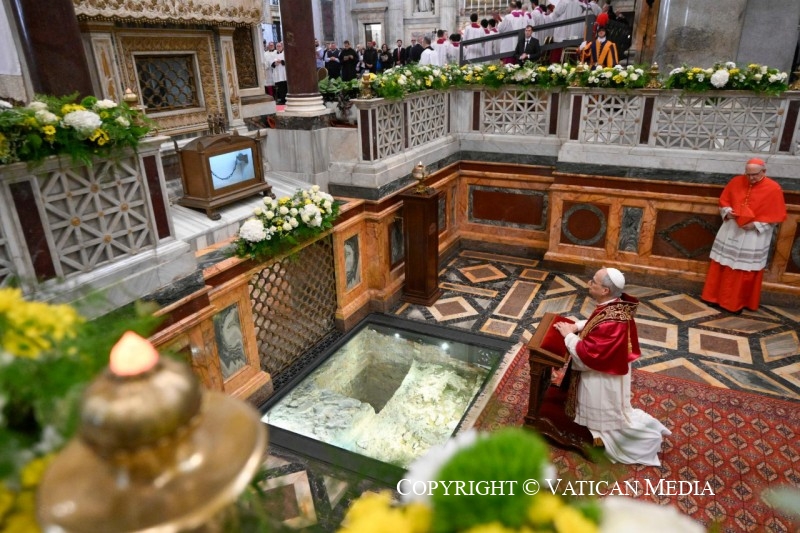
The Pope: God loves us. This is the great truth of our life and it gives meaning to everything else
Exaudi Staff
20 May, 2025
4 min
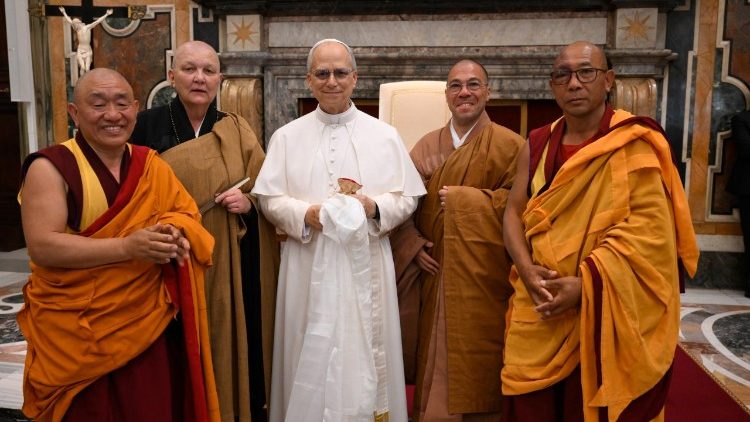
Leo XIV: “Let us say no to the economy that impoverishes”
Exaudi Staff
19 May, 2025
7 min
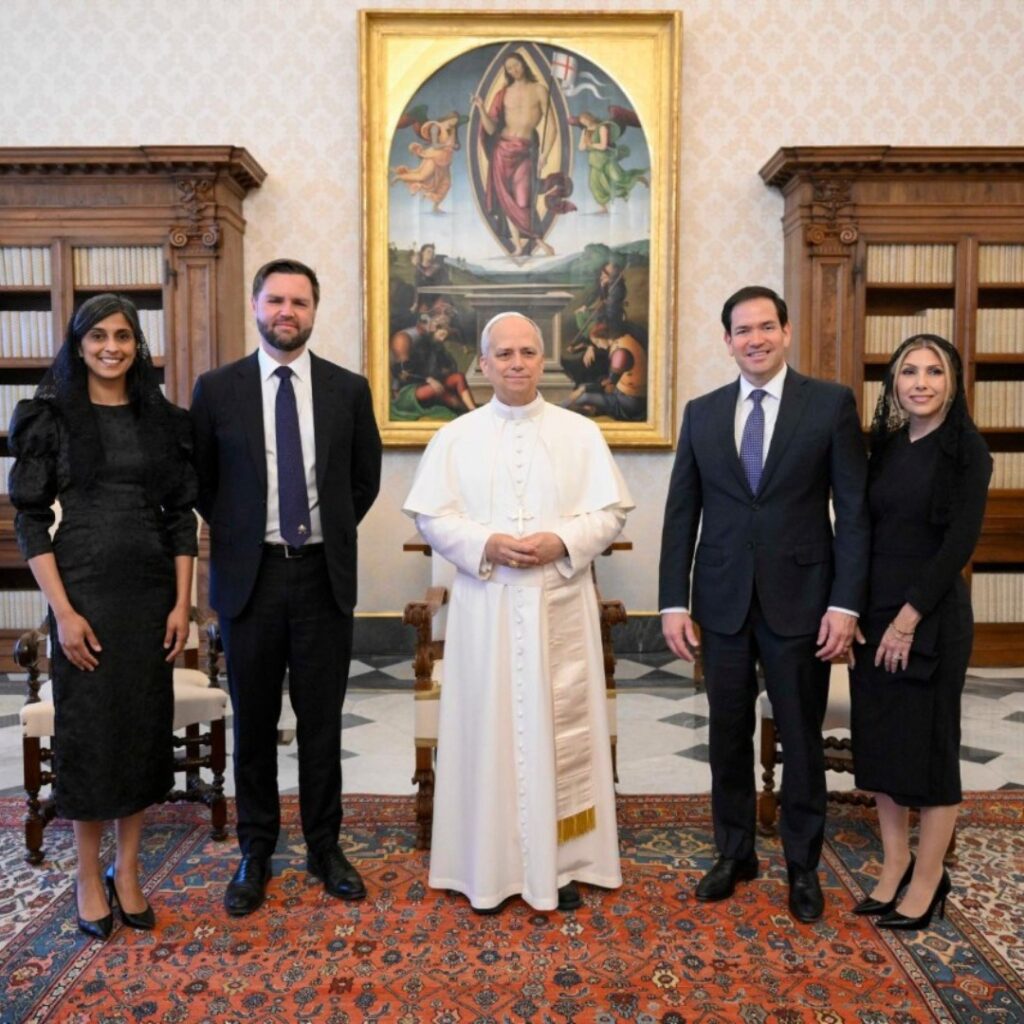
Pope Leo XIV Receives US Vice President Vance
Exaudi Staff
19 May, 2025
1 min
 (EN)
(EN)
 (ES)
(ES)
 (IT)
(IT)

